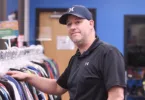
The average age of child sex-trafficking victims worldwide is 12 years old. (CNS photo/Lisa Johnston, St. Louis Review)
by Olivia Martin
olivia.martin@theleaven.org
OLATHE — “Do not ever think or say, ‘Not my kid’” was the message from speaker Russ Tuttle to middle and high school students and their parents at Prince of Peace Parish here June 10. Tuttle joined Stacy Lareau in a team presentation on domestic minor sex trafficking.
Both work with KC Street Hope, a local alliance of Christian churches, community partners and volunteers that collaborate to end sex trafficking.
The evening was split into two sessions: one for adults; the other for students.
While Tuttle spoke to the students, Lareau spoke to the adults, opening her address by identifying socially accepted addictions that can be dangerous for children, such as online gaming, social media and pornography.
“All digital devices have the potential to be addictive if misused,” said Lareau. “Cellphones are addictive in the same way as slot machines.”
According to the National Center for Sexual Exploitation, said Tuttle, anytime anyone is on a computer or smartphone, there are no more than five clicks separating the user from pornography.
“Every single time,” he stressed, “every single person is targeted, baited or trapped by pornography. Five clicks.”
Through the increasing acceptance of electronically based, socially accepted addictions, professionals are noticing an increase in something called “nomaphobia,” said Lareau, which is also known as “phone separation anxiety.”
But how does this relate to human trafficking?
Lareau explained that each smart phone or electronic device with a screen and internet capability can be misused — to coerce.
“There are kids around the world, in the United States — in Kansas City — that are being sexually exploited for money,” she said.
From the mall to parties to restaurants to the bowling alley, trafficking could happen anywhere, explained Lareau. So, it’s vital to be educated and alert about reality.
Jedida Kamau, a Prince of Peace parishioner who attended the presentation with her husband Ngugi and daughters, was alarmed by the true stories of local trafficking cases that Lareau shared.
“I’ve heard it’s in Kansas City,” she said, “but hearing about [it in] Johnson County, to people who are living here, is kind of scary.”
A shocking statistic was surfaced by a 2013 study conducted by Arizona State University across 15 cities in the United States — Kansas City being one of them.
In the study, the school ran fake online ads offering sex to see how many people over the age of 18 were online actively looking for sex.
The results were startling.
“In the Kansas City area, it was 14.5 percent,” said Lareau. “In 2013, 14.5 percent is 106,000 men that were online shopping to buy women for sex.”
“What does that tell us?” prodded Lareau.
“The demand is high,” she said, “and the demand in Kansas City is high.”
With over two million children trafficked worldwide with an average age of 12, the industry grows larger every year.
“It is a targeted market just like any other,” said Lareau. “Being aware helps us to know how to combat this in a knowledgeable way.”
The number one place for trafficking, she continued, is online chat rooms, which nowadays are accessed through a myriad of smartphone apps.
Snapchat, Tinder and Oovoo are some popular apps among teens that, while not innately harmful, can easily be misused.
“There are so many apps,” said Ngugi Kamau. “So many times, I go to my kids’ phones and I don’t know what [the apps] are. I wanted to learn more about that.”
Tuttle also stressed that it is important for parents to know and monitor the apps and information on their kids’ phones — especially passwords and apps that may be hidden in nested folders.
“It’s not a trust issue,” he said.
“They’re being targeted,” he continued. “That’s the challenge and the problem.
“That’s why I’m passionate about this.”
“Bottom line,” said Lareau, “human trafficking is exploitation of human vulnerability. It’s our responsibility to lessen the vulnerabilities.”
One of the most important ways to decrease these vulnerabilities is through constant dialogue between parents and children — and especially among peers.
Vanessa Kamau, 12, was shocked to learn that traffickers target girls her age and is determined to start the dialogue about it.
“I’ll be sure to spread the word to my friends that [we] need to be careful about it,” she said, “and it’s not just a story you hear.
“It’s not a one-time thing — it happens all the time.”
After recommending a variety of home internet filters such as Covenant Eyes, Tuttle stressed to parents to not become overwhelmed.
“Don’t live in fear — be wise,” he said.
“Kids are not bad; kids want boundaries,” he concluded. “They’re not going to tell us that, but deep down they want them, so let’s provide that for them.”
If you or someone you know is being targeted or trafficked — either online or off — call 911 immediately.
For more information about KC Street Hope, visit the website at: www.kcstreethope.org.






